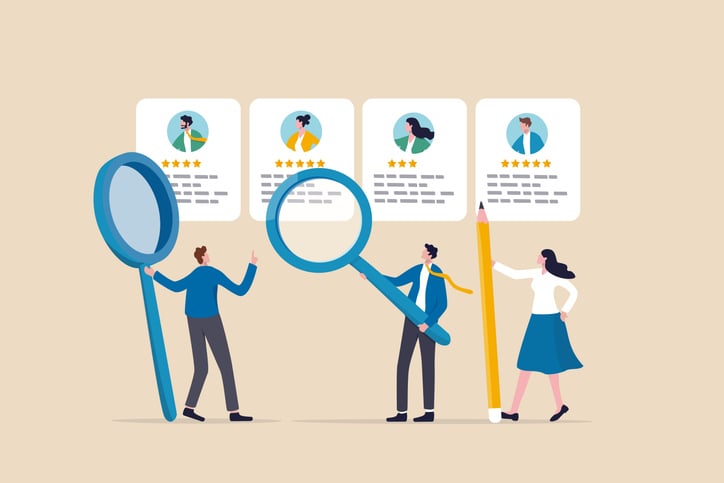While artificial intelligence may still sound conceptually intimidating or futuristic to some, most of us encounter and use AI daily – from the personalized recommendations we receive while shopping online, to the chatbot that answers our banking questions, to the smart assistant on our phones. Applications of AI already serve to streamline and personalize our experiences in a variety of contexts, and with the development of new applications and the advancement of technology only accelerating, we can expect AI to play new and expanding roles in the coming years.
This is certainly true for hiring and recruitment, where using algorithms to match candidate resumes with job descriptions, analyze applicant patterns, and segment job seekers by education, skill, experience, and retention potential is becoming an increasingly common practice. A survey by Modern Hire reports that nearly three in four companies surveyed increased their spending on this kind of technology last year, while 70% intend to maintain this investment in 2023.
However, according to an April 2023 article for Computerworld, concerns over bias and data security have inspired a wave of new legislation aimed at limiting and regulating the use of AI in hiring. HR professionals and recruiters who wish to stay on the cutting edge of progress in the field by making use of artificial intelligence hiring tools must ensure they are aware and informed of the associated challenges and potential legal limitations.
Use of AI in hiring reveals unexpected challenges
Two key challenges to consider when implementing AI technology in your hiring and recruitment processes are emergent issues with bias and privacy.
Although a goal of AI-based talent acquisition programs is often greater inclusion and diversity through the elimination of human bias in hiring decisions, studies indicate that such bias can sometimes be baked into the algorithm. The United States and European Union recently issued a joint report illustrating this challenge. While artificial intelligence can have positive impacts on workforce innovation and efficiency, the report notes that “there is substantial evidence… AI has introduced and perpetuated racial or other forms of bias, both through issues with the underlying datasets used to make decisions, and by unintentional or seemingly benign decisions made by algorithm designers.” In other words, if AI software uses an organization’s previous hiring data to develop an algorithm, the tool can inherit and reproduce any human bias or subconscious preferences lurking in said data. A recent example of this was Amazon’s applicant screening algorithm, which drew on Amazon’s past hiring data and, as a result, ultimately showed a bias against female candidates, consistently ranking applications including the word “woman” lower than those that didn’t.
Another burgeoning concern with AI hiring tools is applicant privacy. AI talent acquisition platforms often collect extensive data on job seekers to improve searches for possible candidates, sometimes including facial recognition software and video interviews that employers may retain, share, and filter using AI to determine applicant favorability. This can have potentially troublesome implications for the privacy and data security of candidates when their data is collected and stored without transparency or their expressed permission.
Legislative efforts increase to address AI challenges
These growing concerns around bias and privacy have prompted legislative bodies at the municipal, state, and national levels to begin drafting and instituting laws to regulate the use of artificial intelligence in hiring.
A local law establishing guidelines around the use of AI-based hiring tools is set to go into effect this month in New York City. Local Law 144 would require companies using such platforms to disclose the use of AI to New York-based job candidates, as well as to institute bias auditing procedures and publicize the resulting data. Despite the municipal scope of this law, New York City’s outsized influence in finance and commerce and its status as an epicenter of business may inspire similar legislation elsewhere.
At the state level, California, Illinois, Maryland, and Washington are among those passing or considering regulatory legislation around the use of artificial intelligence in hiring, with Illinois and Maryland already having laws on the books mandating that the use of facial recognition and AI analysis of video interviews must be disclosed to job seekers.
Nationally, the US Equal Employment Opportunity Commission has announced its intention to increase oversight of the use of AI for talent acquisition, while the Algorithmic Accountability Act put forth in Congress would require impact assessments in instances where AI is used in the process of determining an individual’s access to or terms of employment.
Taken together, this flurry of legislative action suggests that HR professionals and recruiters who intend to begin or continue using AI in their hiring processes should anticipate and accommodate increased legal regulation as a distinct likelihood.
Key Takeaways
Despite the challenges associated with talent acquisition AI platforms, their adoption and use continue to accelerate. However, when action is taken to by hiring professionals to account for and address these challenges through responsible testing, monitoring, and implementation of AI tools, their many benefits – from increased inclusion and diversity to higher efficiency to better job candidate matches – can be allowed to shine.
Artificial intelligence certainly has an important role to play in the future of hiring, but it is the responsibility of HR and recruitment professionals to supply the human judgment and oversight necessary to ensure that these tools are used efficiently, ethically, and in a manner that complies with legal regulations.
If you have any questions regarding the use of artificial intelligence in hiring and recruitment, a Harger Howe Account Manager would be happy to answer them. If you'd like to learn more about Harger Howe Advertising and our suite of services, please reach out to our President Mike Walsh at mwalsh@hargerhowe.com.









